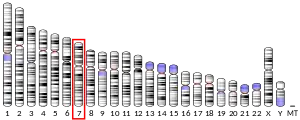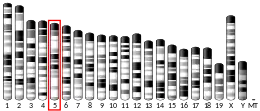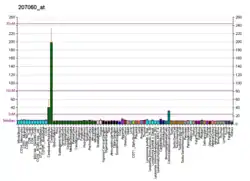EN2 (gene)
Homeobox protein engrailed-2 is a protein that in humans is encoded by the EN2 gene.[5] It is a member of the engrailed gene family.
Function
Homeobox-containing genes are thought to have a role in controlling development. In Drosophila, the 'engrailed' (en) gene plays an important role during development in segmentation, where it is required for the formation of posterior compartments. Different mutations in the mouse homologs, En1 and En2, produced different developmental defects that frequently are lethal. The human engrailed homologs 1 and 2 encode homeodomain-containing proteins and have been implicated in the control of pattern formation during development of the central nervous system.[5]
Description
The Engrailed-2 gene encodes for the Engrailed-2 homeobox transcription factor. The signaling molecule, fibroblast growth factor 8 (FGF8), controls the expression of the En2 gene. The isthmus organizer expresses varying concentrations of FGF8 that influence the En2 transcription factor. En2 transcription factor is involved in patterning the midbrain of the central nervous system during embryonic development. Specifically, it is required for proper positioning of folia in the developing hemispheres. It continues to regulate foliation throughout nervous system development. En2 patterns cerebellum foliation in the mediolateral axis. Several birth defects can arise from inadequate or abnormal En2 expression. Scientists use a mice model to study the effects of En2 knockout alleles on development. When the En2 gene is knocked out, vermis foliation patterning becomes extremely altered. Along with decreased cerebellum foliation complexity, mutations in the En2 gene result in a depleted vermis or an overly simplified foliation pattern. The Engrailed genes are essential to proper neural circuit development.
In cancer diagnosis
A method for diagnosing prostate cancer by detection of EN2 in urine has been developed. The results of a clinical trial of 288 men suggest that EN2 could be a marker for prostate cancer which might prove more reliable than current methods that use prostate-specific antigen (PSA). If effective, a urine test is considered easier and less embarrassing for the patient than blood tests or rectal examinations and, therefore, less likely to discourage early diagnosis. At the time of the report, it was not clear whether or not the EN2 test could distinguish between aggressive tumours that would require intervention and relatively benign ones that would not.[6]
References
- GRCh38: Ensembl release 89: ENSG00000164778 - Ensembl, May 2017
- GRCm38: Ensembl release 89: ENSMUSG00000039095 - Ensembl, May 2017
- "Human PubMed Reference:". National Center for Biotechnology Information, U.S. National Library of Medicine.
- "Mouse PubMed Reference:". National Center for Biotechnology Information, U.S. National Library of Medicine.
- "Entrez Gene: EN2 engrailed homeobox 2".
- Morgan R, Boxall A, Bhatt A, Bailey M, Hindley R, Langley S, Whitaker HC, Neal DE, Ismail M, Whitaker H, Annels N, Michael A, Pandha H (March 2011). "Engrailed-2 (EN2): a tumor specific urinary biomarker for the early diagnosis of prostate cancer". Clinical Cancer Research. 17 (5): 1090–8. doi:10.1158/1078-0432.CCR-10-2410. PMID 21364037. Lay summary – BBC News.
- "University of Surrey licenses the patented use of EN2 protein as a diagnostic biomarker for prostate and bladder cancer to ZEUS Scientific". 13 March 2013. Archived from the original on 7 March 2014. Retrieved 7 March 2014.
- "Licence deal brings breakthrough prostate cancer test closer to clinical use". 13 March 2013.
Further reading
- Cheng Y, Sudarov A, Szulc KU, Sgaier SK, Stephen D, Turnbull DH, Joyner AL (February 2010). "The Engrailed homeobox genes determine the different foliation patterns in the vermis and hemispheres of the mammalian cerebellum". Development. 137 (3): 519–29. doi:10.1242/dev.027045. PMC 2858911. PMID 20081196.
- Logan C, Hanks MC, Noble-Topham S, Nallainathan D, Provart NJ, Joyner AL (1993). "Cloning and sequence comparison of the mouse, human, and chicken engrailed genes reveal potential functional domains and regulatory regions". Developmental Genetics. 13 (5): 345–58. doi:10.1002/dvg.1020130505. PMID 1363401.
- Joyner AL, Herrup K, Auerbach BA, Davis CA, Rossant J (March 1991). "Subtle cerebellar phenotype in mice homozygous for a targeted deletion of the En-2 homeobox". Science. 251 (4998): 1239–43. doi:10.1126/science.1672471. PMID 1672471.
- Poole SJ, Law ML, Kao FT, Lau YF (April 1989). "Isolation and chromosomal localization of the human En-2 gene". Genomics. 4 (3): 225–31. doi:10.1016/0888-7543(89)90324-8. PMID 2565873.
- Logan C, Willard HF, Rommens JM, Joyner AL (February 1989). "Chromosomal localization of the human homeo box-containing genes, EN1 and EN2". Genomics. 4 (2): 206–9. doi:10.1016/0888-7543(89)90301-7. PMID 2567700.
- Kozmik Z, Sure U, Rüedi D, Busslinger M, Aguzzi A (June 1995). "Deregulated expression of PAX5 in medulloblastoma". Proceedings of the National Academy of Sciences of the United States of America. 92 (12): 5709–13. doi:10.1073/pnas.92.12.5709. PMC 41766. PMID 7777574.
- Joliot A, Trembleau A, Raposo G, Calvet S, Volovitch M, Prochiantz A (May 1997). "Association of Engrailed homeoproteins with vesicles presenting caveolae-like properties". Development. 124 (10): 1865–75. PMID 9169834.
- "A full genome screen for autism with evidence for linkage to a region on chromosome 7q. International Molecular Genetic Study of Autism Consortium". Human Molecular Genetics. 7 (3): 571–8. March 1998. doi:10.1093/hmg/7.3.571. PMID 9546821.
- Sanger Centre, The; Washington University Genome Sequencing Cente, The (November 1998). "Toward a complete human genome sequence". Genome Research. 8 (11): 1097–108. doi:10.1101/gr.8.11.1097. PMID 9847074.
- Philippe A, Martinez M, Guilloud-Bataille M, Gillberg C, Råstam M, Sponheim E, Coleman M, Zappella M, Aschauer H, Van Maldergem L, Penet C, Feingold J, Brice A, Leboyer M, van Malldergerme L (May 1999). "Genome-wide scan for autism susceptibility genes. Paris Autism Research International Sibpair Study". Human Molecular Genetics. 8 (5): 805–12. doi:10.1093/hmg/8.5.805. PMID 10196369.
- Risch N, Spiker D, Lotspeich L, Nouri N, Hinds D, Hallmayer J, Kalaydjieva L, McCague P, Dimiceli S, Pitts T, Nguyen L, Yang J, Harper C, Thorpe D, Vermeer S, Young H, Hebert J, Lin A, Ferguson J, Chiotti C, Wiese-Slater S, Rogers T, Salmon B, Nicholas P, Petersen PB, Pingree C, McMahon W, Wong DL, Cavalli-Sforza LL, Kraemer HC, Myers RM (August 1999). "A genomic screen of autism: evidence for a multilocus etiology". American Journal of Human Genetics. 65 (2): 493–507. doi:10.1086/302497. PMC 1377948. PMID 10417292.
- Ashley-Koch A, Wolpert CM, Menold MM, Zaeem L, Basu S, Donnelly SL, Ravan SA, Powell CM, Qumsiyeh MB, Aylsworth AS, Vance JM, Gilbert JR, Wright HH, Abramson RK, DeLong GR, Cuccaro ML, Pericak-Vance MA (November 1999). "Genetic studies of autistic disorder and chromosome 7". Genomics. 61 (3): 227–36. doi:10.1006/geno.1999.5968. PMID 10552924.
- Barrett S, Beck JC, Bernier R, Bisson E, Braun TA, Casavant TL, Childress D, Folstein SE, Garcia M, Gardiner MB, Gilman S, Haines JL, Hopkins K, Landa R, Meyer NH, Mullane JA, Nishimura DY, Palmer P, Piven J, Purdy J, Santangelo SL, Searby C, Sheffield V, Singleton J, Slager S (December 1999). "An autosomal genomic screen for autism. Collaborative linkage study of autism". American Journal of Medical Genetics. 88 (6): 609–15. doi:10.1002/(SICI)1096-8628(19991215)88:6<609::AID-AJMG7>3.3.CO;2-C. PMID 10581478.
- Sarnat HB, Benjamin DR, Siebert JR, Kletter GB, Cheyette SR (2002). "Agenesis of the mesencephalon and metencephalon with cerebellar hypoplasia: putative mutation in the EN2 gene--report of 2 cases in early infancy". Pediatric and Developmental Pathology. 5 (1): 54–68. doi:10.1007/s10024-001-0103-5. PMID 11815869. S2CID 20406280.
- Zhong H, Serajee FJ, Nabi R, Huq AH (January 2003). "No association between the EN2 gene and autistic disorder". Journal of Medical Genetics. 40 (1): 4e–4. doi:10.1136/jmg.40.1.e4. PMC 1735256. PMID 12525552.
- Foucher I, Montesinos ML, Volovitch M, Prochiantz A, Trembleau A (May 2003). "Joint regulation of the MAP1B promoter by HNF3beta/Foxa2 and Engrailed is the result of a highly conserved mechanism for direct interaction of homeoproteins and Fox transcription factors". Development. 130 (9): 1867–76. doi:10.1242/dev.00414. PMID 12642491.
- Gharani N, Benayed R, Mancuso V, Brzustowicz LM, Millonig JH (May 2004). "Association of the homeobox transcription factor, ENGRAILED 2, 3, with autism spectrum disorder". Molecular Psychiatry. 9 (5): 474–84. doi:10.1038/sj.mp.4001498. PMID 15024396.
- Hjerrild M, Stensballe A, Rasmussen TE, Kofoed CB, Blom N, Sicheritz-Ponten T, Larsen MR, Brunak S, Jensen ON, Gammeltoft S (2004). "Identification of phosphorylation sites in protein kinase A substrates using artificial neural networks and mass spectrometry". Journal of Proteome Research. 3 (3): 426–33. doi:10.1021/pr0341033. PMID 15253423.
External links
- EN2+protein,+human at the US National Library of Medicine Medical Subject Headings (MeSH)
This article incorporates text from the United States National Library of Medicine, which is in the public domain.




